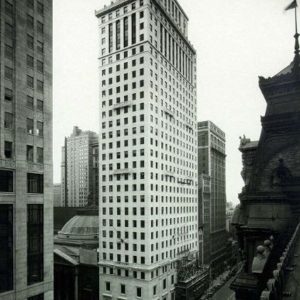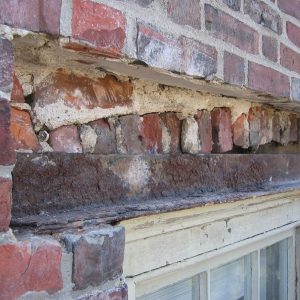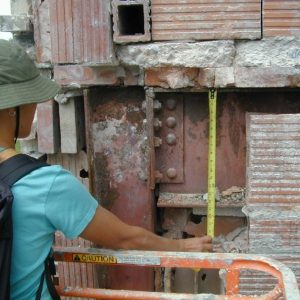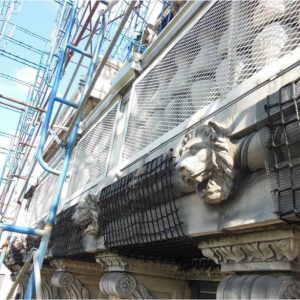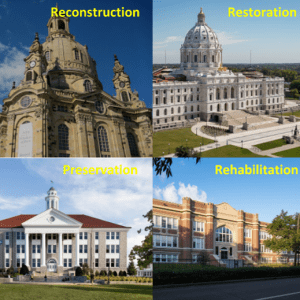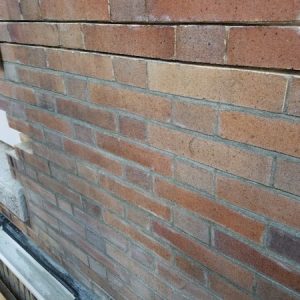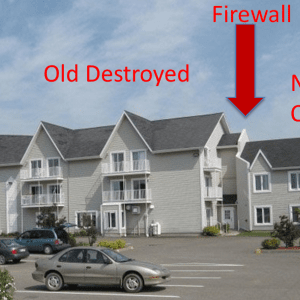Shop
Showing 13–24 of 67 results
-
Historic Masonry
Assessment, Maintenance, and Repair of Transitional Masonry Structures #2: Masonry Systems
$75.00 Add to cartAssessment, Maintenance, and Repair of Transitional Masonry Structures #2: Masonry Systems
This session discusses the typical masonry exterior wall systems, commonly referred to as transitional masonry wall systems and how to identify them. These wall systems combine aspects of both load-bearing masonry and modern curtain wall systems having structural frames. The unique features of such construction are examined along with how these systems work structurally, how they deteriorate, and how they manage water, temperature, air, and vapor transmission. Knowing how these wall systems behave will assist in determining what repair methods and procedures to use.
During Existing Masonry Night School: Assessment, Maintenance, and Repair of Transitional Masonry Structures, instructors discuss the most common issues in assessing, maintaining, and where needed, repairing masonry cladding systems constructed in North America between the 1880 and 1945.
View other courses in this series or purchase the Existing Masonry Bundle to access all 7 and save 10% compared to buying them separately.
$75.00 -
Historic Masonry
Assessment, Maintenance, and Repair of Transitional Masonry Structures #3: Planning a Building Investigation
$75.00 Add to cartAssessment, Maintenance, and Repair of Transitional Masonry Structures #3: Planning a Building Investigation
This session of the existing masonry series focuses on the important aspects of developing an investigation program for a transitional masonry building, including information to gather, areas for inspection, ongoing monitoring, the potential for investigative openings and laboratory testing to inform potential structural analyses to consider. Examples of different deterioration mechanisms and manifestations will be highlighted.
During Existing Masonry Night School: Assessment, Maintenance, and Repair of Transitional Masonry Structures, instructors discuss the most common issues in assessing, maintaining, and where needed, repairing masonry cladding systems constructed in North America between the 1880 and 1945.
View other courses in this series or purchase the Existing Masonry Bundle to access all 7 and save 10% compared to buying them separately.
$75.00 -
Member Discount-75
Assessment, Maintenance, and Repair of Transitional Masonry Structures #4: Testing & Analysis
$75.00 Add to cartAssessment, Maintenance, and Repair of Transitional Masonry Structures #4: Testing & Analysis
Building on concepts presented during prior sessions, this session discusses approaches for obtaining information on material properties and how to use that information to understand structural capacity following applicable codes and guidelines. Several in situ methods are available for determining masonry mechanical properties including compression and shear strength. Laboratory tests are also used for determining material strength in addition to material characteristics such as mortar composition, masonry pore structure, and moisture content. The process of evaluating structural and nonstructural component compliance will be discussed in the context of guidelines and building codes, concentrating on transitional masonry building typologies.
During Existing Masonry Night School: Assessment, Maintenance, and Repair of Transitional Masonry Structures, instructors discuss the most common issues in assessing, maintaining, and where needed, repairing masonry cladding systems constructed in North America between the 1880 and 1945.
View other courses in this series or purchase the Existing Masonry Bundle to access all 7 and save 10% compared to buying them separately.
$75.00 -
Member Discount-75
Assessment, Maintenance, and Repair of Transitional Masonry Structures #5: Rehabilitation Options for Transitional Masonry
$75.00 Add to cartAssessment, Maintenance, and Repair of Transitional Masonry Structures #5: Rehabilitation Options for Transitional Masonry
Once the assessment is complete and the deterioration mechanisms are known, rehabilitation options can be considered. This session introduces rehabilitation options for the transitional masonry wall system to be considered based on deterioration mechanisms, including those related to structural concerns and water management. The session discusses the potential influence of the Secretary of the Interior Standards for the Treatment of Historic Properties in rehabilitation options as they apply to these buildings.
During Existing Masonry Night School: Assessment, Maintenance, and Repair of Transitional Masonry Structures, instructors discuss the most common issues in assessing, maintaining, and where needed, repairing masonry cladding systems constructed in North America between the 1880 and 1945.
View other courses in this series or purchase the Existing Masonry Bundle to access all 7 and save 10% compared to buying them separately.
$75.00 -
Member Discount-75
Assessment, Maintenance, and Repair of Transitional Masonry Structures #6: Implementation of a Rehabilitation Project for Transitional Masonry
$75.00 Add to cartAssessment, Maintenance, and Repair of Transitional Masonry Structures #6: Implementation of a Rehabilitation Project for Transitional Masonry
Once an assessment is complete and a rehabilitation approach has been selected, implementing the rehabilitation work is the next milestone. Bid documents for rehabilitation projects of traditional masonry wall systems should address two fundamental issues. First, all existing conditions, particularly concealed conditions, are not known and can’t be known until the work begins. Further, these conditions are progressively revealed as the work progresses. Second, the as-built geometry of the concealed portions of assembly may differ from what was revealed during the investigation or what was shown on the drawings. These geometries and concealed conditions could require modifications of the assumed repair details and potentially the scope and extent of repairs. Once the repair work begins, interaction and communication between the contractor, designer and owner are critical to the success of the project and controlling project costs. This session introduces the basic approaches for implementation of the rehabilitation including document preparation and field implementation of the repairs.
During Existing Masonry Night School: Assessment, Maintenance, and Repair of Transitional Masonry Structures, instructors discuss the most common issues in assessing, maintaining, and where needed, repairing masonry cladding systems constructed in North America between the 1880 and 1945.
View other courses in this series or purchase the Existing Masonry Bundle to access all 7 and save 10% compared to buying them separately.
$75.00 -
Member Discount-75
Assessment, Maintenance, and Repair of Transitional Masonry Structures #7: Developing a Maintenance Plan for Existing Masonry
$75.00 Add to cartAssessment, Maintenance, and Repair of Transitional Masonry Structures #7: Developing a Maintenance Plan for Existing Masonry
While masonry is extraordinarily durable, maintenance is required from time to time. Based on inspection and assessments performed, issues may be found that require regular monitoring. Learn about common maintenance for masonry to ensure it continues to serve as intended. Techniques to routinely monitor the condition of masonry, cracks and more will also be discussed.
During Existing Masonry Night School: Assessment, Maintenance, and Repair of Transitional Masonry Structures, instructors discuss the most common issues in assessing, maintaining, and where needed, repairing masonry cladding systems constructed in North America between the 1880 and 1945.
View other courses in this series or purchase the Existing Masonry Bundle to access all 7 and save 10% compared to buying them separately.
$75.00 -
Balanced Fire Safety Design and Resilient Masonry Fire Walls
This course reviews US fire statistics, the Balanced Fire Safety Design concept and the role that passive masonry firewalls play in it. Examples of how today’s building codes have eroded the Balanced Design Concept are shared to provide a better understanding of the crucial role fail-safe, passive masonry fire walls play in today’s fire safety designs. To gain insight into wall assembly and material performance the ASTM E-119 fire test method that is used to qualify and quantify fire walls is reviewed along with the ACI/TMS 216 code requirements for concrete and masonry wall assembly fire resistance ratings.
$75.00 -
Design and Detailing of Perforated Screen Walls
Architects are using brick in unique ways as a material of choice and have experimented with incorporating voids in the cladding. Brick screen walls have been used in residential applications for decades to screen undesirable elements such as trash and HVAC equipment. In fact, perforated walls were common in Persia dating back centuries. Now, architects are using screen walls for the entire façade of a structure. With this increased usage is an increased desire to have rules on how to design these elements. Brian E. Trimble, Director, Industry Development and Technical Services of the International Masonry Institute explores the various ways that perforations can be incorporated within a wall cladding. General rules of thumb will be shown on whether these walls can be used for certain projects. Some information on structural design will be provided, but that information is currently lacking due to lack of research. Examples of how perforated walls were designed on projects around the world will be showcased leading to ways to design these walls.
$75.00 -
Design of Masonry Shear Walls
The design of reinforced masonry shear walls using both the Allowable Stress Design method and the Strength Design method is covered in this lesson.
$75.00 -
Design of Movement and Control Joints for Masonry
This lesson addresses the movement characteristics of masonry wall systems, and compares the differences between architectural veneer and structural reinforced masonry. Focus is on best practice for design and construction of expansion and control joints to accommodate and/or restrict masonry material movement.
This course is free to TMS Members. See more membership benefits and become a member here. If you’re already a Member, log in to access this course from your Course Dashboard.
$75.00 -
Exterior Masonry Walls and Energy Code Compliance
This lesson provides an overview of energy code provisions, reviews energy studies performed utilizing whole building analysis, and provides recommendations for cost effective energy efficient solutions for energy efficient exterior masonry wall designs.
$75.00 -
Lintels in Masonry Walls
This lesson reviews the behavior and load distribution of a lintel within a wall, to help design this common element more effectively and efficiently.
$75.00

